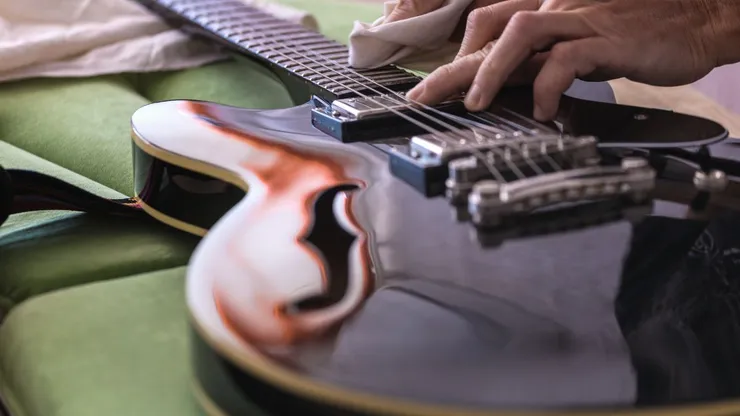Why Is Guitar Maintenance So Important?
Over time, even the finest guitars can sadly succumb to wear and tear - strings may fray, frets wear down, and wood can warp. All of this can significantly affect your instrument’s sound quality and playability. Regular guitar maintenance is, therefore, crucial, not only for preserving your guitar’s elegant appearance but also for ensuring that it performs at its pinnacle.
Learning the subtleties of guitar maintenance, from the simple act of cleaning your guitar to more elaborate procedures like adjusting the action or intonation, will provide you with the knowledge to protect your investment and keep your guitar sounding at its best for years to come.
Guitar Maintenance Starts With Regular Cleaning!
First things first, keep your guitar clean! Doing so will keep it looking shiny and new, but more importantly, it will prolong its life. After noodling on your axe, your fingers will leave behind sweat, dirt, and grease, all of which can corrode and prematurely wear out your strings. So, after every jam session, take a few seconds to wipe down your strings with a dry cloth.
Moreover, it’s also good practice to use a soft, damp cloth to wipe down the body and neck of your guitar at the same time. Avoid using chemical cleaners, as they can damage the wood and finish. For stubborn dirt or grime, try applying a small amount of guitar polish with a microfibre cloth.
Avoid Overconditioning
After learning the benefits of using fretboard oils and cleaners, you might be tempted to use them every time you change strings. Don’t! When it comes to the wood on your guitar, less is more. Overconditioning can lead to a build-up of oils and products that can affect the sound and playability of your instrument.
It’s essential to strike a balance between keeping your guitar hydrated and not overdoing it. Only use such conditioners every few times you replace strings, and remember to wipe off all the excess product.
Maintaining Tuning Stability
One common issue that many guitarists face is keeping their instruments in tune. This is especially common for new guitars as they adjust to the tension of the strings. To help with this, it’s important to properly stretch and break in your strings when you first put them on your guitar.
Additionally, check and adjust the tuning of your guitar regularly. Even if you haven’t played it for a little while, changes in temperature and humidity can affect tuning. Keep a tuner handy, and tune your guitar before every use.
Changing Strings
Unfortunately, changing guitar strings is a necessary evil. If you want your guitar to sound as good as it possibly can, you’re going to need fresh strings - rusty strings will significantly hamper your playing experience. If your strings are starting to look or sound dull, it’s time to change them. It may seem daunting at first, but with care and precision, you’ll get the hang of it in no time.
When changing strings, make sure to properly dispose of the old ones. Wrap them up in a tissue or paper towel and dispose of them in your regular garbage. Be careful not to leave any sharp ends exposed!
Checking for Loose Frets
Loose frets can significantly affect your guitar’s sound. Regularly check for loose frets and, if necessary, repair them immediately. You can use a small rubber mallet or a fret rocker tool to gently tap on each fret and see if there is any movement.
If you notice a loose fret, it’s probably best to take your guitar to a professional luthier for the required repair work - trying to fix it yourself may result in further damage!
Neck Alignment
The alignment of your guitar’s neck is critical to its playability. Ensure you regularly check and fine-tune the neck alignment. You can do this by using a straight edge or a string, aligning it with the frets and checking for gaps between the edge/string and the fretboard. If you notice any inconsistencies, you may need to adjust the truss rod.
Again, if you aren’t 100% sure what you’re doing here, seek professional help for this task. Adjusting the truss rod requires precision, and any mistakes can cause significant damage to your guitar. It’s always better to be safe than sorry!
Deep Clean and Polish
Every once in a while, your guitar will appreciate a good, thorough clean and polish. This will keep it looking great and help maintain its sound quality.
Begin by wiping down the guitar’s body and neck with a soft, lint-free cloth. If there are any stubborn dirt or grime spots, use a slightly damp cloth to clean them away gently. Next, apply a small amount of guitar polish onto another clean cloth and rub it into the body, neck, and fretboard in circular motions. Finally, use a dry cloth to buff away any excess polish and give your guitar a beautiful shine.
Be careful not to use harsh chemicals or abrasive materials, which can damage your instrument’s finish.
Use the Right Products the Right Way
Using the wrong cleaning materials and techniques can damage your guitar. Always opt for products specifically designed for guitar care and maintenance. For example, use a guitar-specific polish and cloth for cleaning and polishing, a fretboard oil for conditioning the fretboard —make sure first that the type of wood is safe for oil cleaning—, and a string cleaner or lubricant to keep your strings in top condition.
When cleaning your guitar, avoid spraying any product directly onto it, as it can seep into tiny crevices and cause damage. Instead, apply a small amount of product onto a cloth and then use that to clean your guitar.
Also, be gentle when cleaning your guitar - there’s no need for excessive elbow grease! Use soft cloths and gentle motions to avoid damaging your instrument’s delicate finish.
Don’t Forget About Storage!
Proper storage is crucial for maintaining your guitar’s condition. When not in use, it should be stored in a cool, dry place away from direct sunlight or extreme temperatures. A hard-shell case is the best option for storing your guitar, as it provides protection from potential impacts and environmental factors.
If you don’t have a hard-shell case, make sure to cover your instrument with a cloth or towel at the very least to protect it from dust and accidental bumps. Additionally, avoid leaning your guitar against walls or other objects, as this can lead to scratches or dings on the body.
Knowing When ‘Guitar Maintenance’ Means Taking it to a Professional
While regular cleaning and maintenance can go a long way in keeping your guitar in good condition, there are times when it’s best to leave it to the professionals. If you notice any major damage or issues with your instrument, don’t attempt to fix it yourself. Instead, take your guitar to a qualified luthier who can properly assess and repair any problems.
Finding Your Perfect Guitar
Proper care for your guitar will go a long way towards preserving its physical appearance, but maintenance is about so much more than just looks. Taking care of your instrument will help ensure optimal performance, giving you a guitar that not only sounds better but lasts longer, too.
So, now that you know everything you need to know about guitar maintenance, how about we help you find the perfect guitar for you to take care of? Enter all your guitar must-haves to quickly search our massive database, and with the help of our fantastic Finder tool, you’ll be just a few clicks away from the axe of your dreams!

